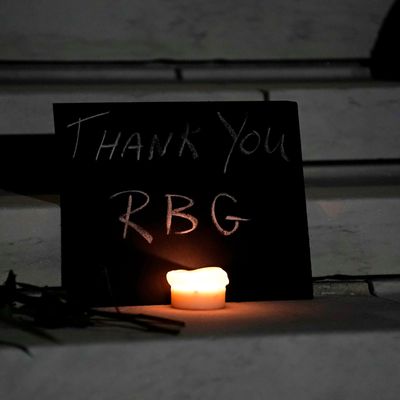
The death of Ruth Bader Ginsburg on Friday night has entirely reshaped the 2020 election. It has shifted the focus away from the pandemic to the Supreme Court and further divided an already fractured polity just at the moment that the coronavirus death toll in the United States has reached 200,000. But aside from transforming the political discourse, it has already had a far more tangible impact on the election, unleashing an unprecedented torrent of small-dollar fundraising for Democrats.
Since Ginsburg’s death, well over $100 million in new donations has come in to Democratic campaigns via ActBlue, the online fundraising hub. In particular, nearly $20 million has been donated through a web page entitled Get Mitch or Die Trying run by hosts of Pod Save America, a popular liberal podcast hosted by Obama-administration veterans. As a default, these funds have been directed equally to candidates running in over a dozen competitive Senate races. This means that just from this effort alone, Democratic hopefuls in states from Alaska to Georgia have raised over $1 million from one fundraising web page on one weekend.
Democrats had been raking in money at a remarkable pace even before Ginsburg’s death. The campaign-finance reports for August showed a massive fundraising haul for Joe Biden and the Democratic National Committee, with joint efforts combining to take in $364.5 million, a record for any presidential campaign in a single month. In contrast, Trump and allied efforts raised $210 million. However, the events of the weekend concentrated attention on down-ballot races as the balance of power in the Senate loomed just as large as the presidential race.
Tommy Vietor, a former Obama-administration official and one of the hosts of Pod Save America, told Intelligencer that he had never seen anything like the enthusiasm demonstrated over the weekend. He said the fund had been set up “a couple of years ago” to focus attention on Senate races, and until Friday night, it had raised a total of $3.5 million. As of early Monday, that total was over $21 million.
He said that the sums raised could make a significant difference in some races. Vietor cited the special election for U.S. Senate in Georgia — where the favored Democratic candidate Raphael Warnock had only raised a total of $4.5 million as of the most recent campaign-finance report — and in Alaska, where the cash infusion for Democratic-backed independent Al Gross could make the difference between not being on television at all and paying for a couple of weeks’ worth of television ads. Generally, he thought the aid was “particularly meaningful in states where Trump and Biden campaigns aren’t competing” on the airwaves. Already, in one lower-tier Senate race, Intelligencer has learned that Mississippi Democrat Mike Espy (who was a late add to the Pod Save America page on Sunday afternoon) has raised $650,000 since Friday night. This was more than the former congressman had raised in the three months covered in his most recent campaign-finance report.
Money funneled to individual campaigns can make more of an impact than that to outside groups or super-PACs under federal law, which gives political campaigns the “lowest unit rate” discount when buying television ads. As Sean McElwee, the executive director of the progressive group Data for Progress, argued, “Campaigns are legally privileged entities, so money to them is more valuable than super-PAC money. This money will allow Democrats to spend more efficiently than Mitch McConnell.”
However, with voting already started in a number of states and with just over six weeks left, there are limits to what can be done. Liam Donovan, a veteran Republican strategist, told Intelligencer that the impact was limited in most competitive races where campaigns were already amply funded. Instead, Donovan argued that this served as “a quantifiable metric of intensity” as well as a coping mechanism for liberal donors. As he put it: “What it says to me is they feel profoundly out of control, and what better way to get a sense of control by investing in these races; that’s what Democrats are harnessing. These guys are desperate for a way to assert some kind of control on a completely chaotic 2020 — to the tune of a cool $100 million.”
Republican strategist Matt Gorman agreed. A top aide to the National Republican Congressional Committee during the blue wave of the 2018 midterms, Gorman noted, “Democrats have never in the last couple of years lacked for cash, but at some point there are diminishing returns.” Gorman generally thinks that Ginsburg’s death “jazzes up both party’s bases even more than they already were.”
The ultimate impact on the election won’t be known until November, but in the meantime, it’s given a lot of Democrats a lot more money to spend between now and then.





























